Reception
P. Schuyler Miller, reviewing the work in Analog Science Fiction / Science Fact , notes that "[t]he subtitle of this book explains its content well enough," calling it "a running account of the wrong-headedness of irrational Man, which seems to make him a natural patsy for con-men." By its end, the reader "will have dipped into the various forms which magic has taken and is taking, and will have been introduced to some of the eminent dupes who believed in it and the successful charlatans and fanatics who hoodwinked them." In fact, his "main quarrel with the book" is that "it is presented almost wholly as a ballet of dupes and charlatans;" he considers the authors "a little too unyielding in their criteria for distinguishing between scientists and charlatans," adding "I have the feeling that the de Camps, rationalists themselves, simply could not generate the same kind of understanding interest in this behavior that they showed in their examination of ancient ruins (archeological and archaeologists), or that Sprague brought to his classic study of lost continents." He views "[b]y far the best" the last chapter, "'The Great Glass Jewel,' which sums up the authors' conclusions about the interrelationships of magic, religion and science." He praises the bibliography as the kind he "like[s] to see ... limited to the references the author has used and to which he makes useful references." [5]
Judith Merril, writing in The Magazine of Fantasy and Science Fiction , calls the book "the usual meticulous de Camp work--or doubly so, since this one is co-authored by L. Sprague and Catherine C." She assesses it as "a fascinating study of magic, in history and practice." [6]
Lin Carter, rating it as the best non-fiction book of 1965 in the category of horror-fantasy books, called it "absolutely brilliant ... an utterly magnificent study of all phases of occultism, Theosophy, the Rosicrucians, spiritualism, alchemy, etc.--flawlessly researched, superbly erudite, beautifully written, and as devast[at]ingly keen-edged a hatchet-job as any since Voltaire invented the fine art of debunking." [7] In a more in-depth review, he explains he finds the book "so enjoyable" because it explains "what real magic is really like," noting that "the authors explore every phase of black magic and occult lore to give ... a fascinating glimpse of ... just what these occult sciences really are, how they were supposed to work, and it makes for absorbing, entertaining reading." He calls the authors "witty, urbane, erudite, scrupulously detached." [8] He also calls it "one of the most readable, witty, anecdotal and entertaining books ever on occultism and the Black Arts." [9]
Fritz Leiber, singling out the history of magic as "the chiefest topic" of the book, welcomed it as "a book by competent scholars restating and extending the scientific arguments against the efficacy of magic, prophecy, necromancy, and other sorts of jiggery-pokery," for which he thought it "high time." He wrote "[w]e need more of this outlook in a culture uncritically obedient to advertising and propaganda, and falling dangerously in love with the irrational." Together with a selection of similar works on other subjects he felt it constituted "a readable sound backbone for a skeptic's library." Elements Leiber cited with approval included the de Camps' examination of "the primitive foundations of sorcery," the "historical development and ... modern instances of astrology, consultation of oracles, prophecy, witchcraft, alchemy, numerology, belief in fairyland, mesmerism (dubious parent of hypnotism, spiritualism, and theosophy." He commended them for their "sturdy moral stand" against occult charlatans and the mindsets of their "natural prey"—in the words of the authors, "people who want knowledge without study, health without self-discipline, wealth without work, safety without precautions, and, in general, happiness without earning it." [10]
Fantasy comedy or comic fantasy is a subgenre of fantasy that is primarily humorous in intent and tone. Typically set in imaginary worlds, fantasy comedy often involves puns on, and parodies of, other works of fantasy.

Sword and sorcery (S&S) or heroic fantasy is a subgenre of fantasy characterized by sword-wielding heroes engaged in exciting and violent adventures. Elements of romance, magic, and the supernatural are also often present. Unlike works of high fantasy, the tales, though dramatic, focus on personal battles rather than world-endangering matters. Sword and sorcery commonly overlaps with heroic fantasy. The genre originated from the early-1930s works of Robert E. Howard. The term "sword and sorcery" was coined by Fritz Leiber in the May 1961 issue of the fantasy fanzine Amra, to describe Howard and the stories that were influenced by his works. In parallel with "sword and sorcery", the term "heroic fantasy" is used, although it is a more loosely defined genre.

The Year's Best Fantasy Stories is an anthology of fantasy stories, edited by American writer Lin Carter. It was first published in paperback by DAW Books in 1975. Despite the anthology's title, it actually gathers together pieces originally published during a two-year period, 1973 and 1974.

The Swordsmen and Sorcerers' Guild of America or SAGA was an informal group of American fantasy authors active from the 1960s through the 1980s, noted for their contributions to the "Sword and Sorcery" kind of heroic fantasy, itself a subgenre of fantasy. When it developed a serious purpose that was to promote the popularity and respectability of Sword and Sorcery fiction.
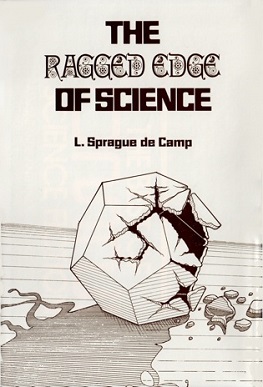
The Ragged Edge of Science is a science book by L. Sprague de Camp, illustrated by Don Simpson. It was first published by Owlswick Press in 1980.
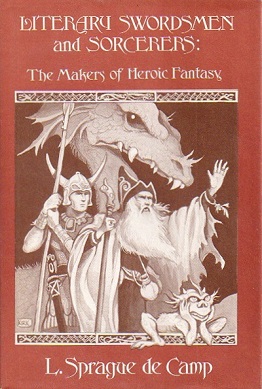
Literary Swordsmen and Sorcerers: The Makers of Heroic Fantasy is a work of collective biography on the formative authors of the heroic fantasy genre by L. Sprague de Camp (1907–2000), first published in 1976 by Arkham House in an edition of 5,431 copies. Nine chapters (2–10) are revisions from a series of ten articles, also titled "Literary Swordsmen and Sorcerers," that initially appeared in the magazine Fantastic and the fanzine Amra between 1971 and 1976. A French edition was issued in May 2010 under the title Les pionniers de la fantasy, and an ebook edition was issued in June 2014 by Gateway/Orion.

Catherine Crook de Camp was an American science fiction and fantasy author and editor. Most of her work was done in collaboration with her husband L. Sprague de Camp, to whom she was married for sixty years. Her solo work was largely non-fiction.

Tales from Gavagan's Bar is a collection of fantasy short stories by American writers L. Sprague de Camp and Fletcher Pratt, illustrated by the latter's wife Inga Pratt. It was first published in hardcover by Twayne Publishers in 1953; an expanded edition rearranging the contents and adding pieces not in the first was published in hardcover by Owlswick Press in June 1978. The original illustrations were retained in this edition. It was subsequently issued in paperback by Bantam Books in January 1980. An e-book edition was published by Gollancz's SF Gateway imprint on September 29, 2011 as part of a general release of de Camp's works in electronic form. The collection has also been published in German.

Conan is a 1967 collection of seven fantasy short stories and associated pieces written by Robert E. Howard, L. Sprague de Camp and Lin Carter featuring Howard's seminal sword and sorcery hero Conan the Barbarian. Most of the stories were originally published in various pulp magazines. The book was first published in paperback by Lancer Books in 1967, and was reprinted in 1968, 1969, 1970, 1971, 1972 (twice) and 1973. After the bankruptcy of Lancer, publication was taken over by Ace Books. Its first edition appeared in May 1977, and was reprinted in 1979, 1982 (twice), 1983, 1984, 1985, 1986, and 1990. The first British edition was issued by Sphere Books in 1974, and was reprinted in 1977. The book has also been translated into German, Japanese, French, Spanish, Italian, Swedish and Dutch. It was gathered together with Conan of Cimmeria and Conan the Freebooter into the omnibus collection The Conan Chronicles.
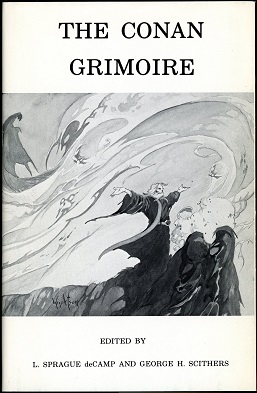
The Conan Grimoire is a 1972 collection of essays, poetry and fiction edited by L. Sprague de Camp and George H. Scithers, published in hardcover by Mirage Press. The essays were originally published as articles in Scithers' fanzine Amra. The book is a companion to Mirage’s previous two volumes of material from Amra, The Conan Reader (1968) and The Conan Swordbook (1969). Most of the material in the three volumes, together with some additional material, was later reprinted in two de Camp-edited paperback anthologies from Ace Books; The Blade of Conan (1979) and The Spell of Conan (1980).
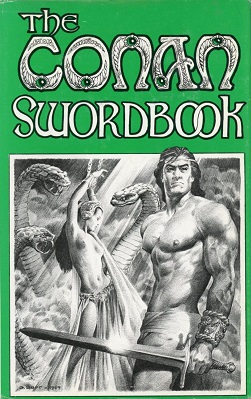
The Conan Swordbook is a 1969 collection of essays edited by L. Sprague de Camp and George H. Scithers, published in hardcover by Mirage Press. The essays were originally published as articles in Scithers' fanzine Amra. The book is a companion to Mirage's other two volumes of material from Amra, The Conan Reader (1968) and The Conan Grimoire (1972). Most of the material in the three volumes, together with some additional material, was later reprinted in two de Camp-edited paperback anthologies from Ace Books; The Blade of Conan (1979) and The Spell of Conan (1980).
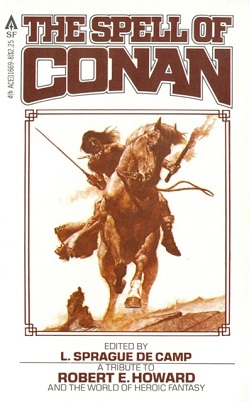
The Spell of Conan is a 1980 collection of essays, poems and fiction edited by L. Sprague de Camp, published in paperback by Ace Books. The material was originally published as articles in George H. Scithers' fanzine Amra. The book is a companion to Ace's earlier volume of material from Amra, The Blade of Conan (1979). Most of the material in the two volumes, together with some additional material, was reprinted from three previous books issued in hardcover by Mirage Press; de Camp's collection The Conan Reader (1968), and the de Camp and Scithers-edited anthologies The Conan Swordbook (1969). and The Conan Grimoire (1972).
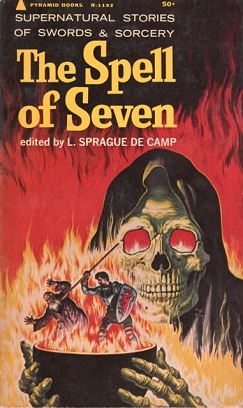
The Spell of Seven is an anthology of fantasy short stories in the sword and sorcery subgenre, edited by L. Sprague de Camp and illustrated by Virgil Finlay. It was first published in paperback by Pyramid Books in June 1965, and reprinted in December 1969. It was the second such anthology assembled by de Camp, following his Swords and Sorcery (1963).

Warlocks and Warriors is an anthology of fantasy short stories in the sword and sorcery subgenre, edited by American writer L. Sprague de Camp. It was first published in hardcover by Putnam in 1970, and in paperback by Berkley Books in 1971. It was the fourth such anthology assembled by de Camp, following his earlier Swords and Sorcery (1963), The Spell of Seven (1965), and The Fantastic Swordsmen (1967).

Kingdoms of Sorcery: An Anthology of Adult Fantasy is an anthology of fantasy stories, edited by American writer Lin Carter. It was first published in hardcover by Doubleday in January 1976 as the first of two such anthologies continuing a series of nine assembled by Carter for the Ballantine Adult Fantasy series.
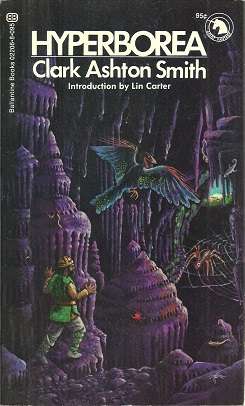
Hyperborea is a collection of fantasy short stories by Clark Ashton Smith, edited by Lin Carter. It was first published in paperback by Ballantine Books as the twenty-ninth volume of its Ballantine Adult Fantasy series in April 1971. It was the second themed collection of Smith's works assembled by Carter for the series. The stories were originally published in various fantasy magazines from the 1930s to the 1950s, notably Weird Tales.
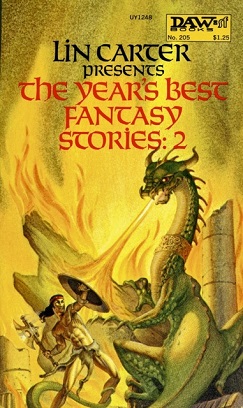
The Year's Best Fantasy Stories: 2 is a 1976 anthology of fantasy stories, edited by American writer Lin Carter. It was first published in paperback by DAW Books.

Swords Against Tomorrow is an anthology of fantasy stories, edited by Robert Hoskins. It was first published in paperback by Signet Books in August 1970.
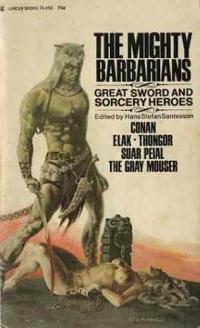
The Mighty Barbarians: Great Sword and Sorcery Heroes is a 1969 anthology of fantasy short stories in the sword and sorcery subgenre, edited by Hans Stefan Santesson. It was first published in paperback by Lancer Books in 1969, and was later followed up by the subsequent Lancer anthology The Mighty Swordsmen. It has been translated into Dutch. Robert M. Price edited a later-day homage to both anthologies called The Mighty Warriors (2018).


















